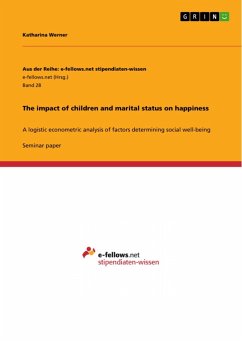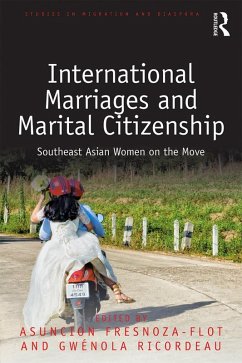
The impact of children and marital status on happiness (eBook, ePUB)
A logistic econometric analysis of factors determining social well-being
Sofort per Download lieferbar
Statt: 18,95 €**
15,99 €
inkl. MwSt. und vom Verlag festgesetzt.
**Preis der gedruckten Ausgabe (Broschiertes Buch)
Alle Infos zum eBook verschenkenWeitere Ausgaben:

PAYBACK Punkte
0 °P sammeln!
Seminar paper from the year 2011 in the subject Sociology - Relationships and Family, grade: 1,0, University of Cincinnati (College of Business), course: Binary Choice Models, language: English, abstract: - Determining factors influencing happiness and well-being becomes increasingly important as politics solely based on the maximization of income/GDP miss the goal of increasing well-being. - This study utilizes data from the 2008 wave of the General Social Survey - a survey comprised of demographic, behavioral, and attitudinal questions - to determine factors that influence the probability of...
Seminar paper from the year 2011 in the subject Sociology - Relationships and Family, grade: 1,0, University of Cincinnati (College of Business), course: Binary Choice Models, language: English, abstract: - Determining factors influencing happiness and well-being becomes increasingly important as politics solely based on the maximization of income/GDP miss the goal of increasing well-being. - This study utilizes data from the 2008 wave of the General Social Survey - a survey comprised of demographic, behavioral, and attitudinal questions - to determine factors that influence the probability of being happy. - As expected, positive general factors are marriage, a high education and the per capita family income. However, only marriage has a high statistical significance. - Negative determinants are unemployment, the number of hours worked per week, a decrease in the family income and a perceived low relative income (compared to others). - Being a parent, i.e. having at least one child has a negative effect. However, happiness is increasing with a rising number of children. It is important to note that the effects of having children are very different among different groups of people: Children have a strong positive effect on married individuals and a low effect on divorced/separated and widowed ones. Being at least 21 years old when the first child is born increases the likelihood that children have a positive impact on happiness. Surprisingly, the effect of children is positive if the children do not live with their parents or if the parents work a lot. - Social comparison and adaption effects seem to play an important role.
Dieser Download kann aus rechtlichen Gründen nur mit Rechnungsadresse in A, B, BG, CY, CZ, D, DK, EW, E, FIN, F, GR, HR, H, IRL, I, LT, L, LR, M, NL, PL, P, R, S, SLO, SK ausgeliefert werden.













